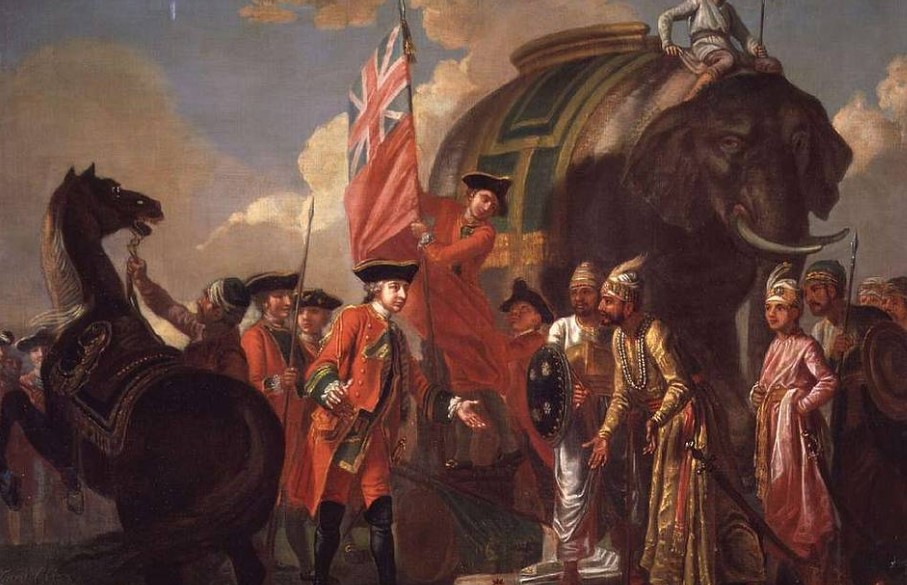
Modern History MCQs – 1 (Arrival of Europeans in India)
Most important multiple choice questions from the chapter – Arrival of Europeans in India MCQs.
Home » UPSC Study Materials » Prelims Express » Chapterwise MCQs » Modern History MCQs » Modern History MCQs – 8 (Important Sessions of Indian National Congress)
Important Sessions of Indian National Congress MCQs with answers and explanations for UPSC and Other examinations.
1. First Session of Indian National Congress was held in which among the following years ?
(a) 1884
(b) 1885
(c) 1886
(d) 1887
Correct Answer – (b) 1885
2. The Indian National Congress was established during the viceroyalty of who among the following ?
(a) Lord Ripon
(c) Lord Elgin II
(b) Lord Lytton
(d) Lord Dufferin
Correct Answer – (d) Lord Dufferin
3. Who among the following was not part of the founding session of the Indian National Congress ?
(a) Dadabhai Naoroji
(b) G. Subramaniya Iyer
(c) Justice Ranade
(d) Surendranath Bannerjee
Correct Answer – (d) Surendranath Bannerjee
4. The second session of the Indian National Congress was presided over by who among the following ?
(a) Ganesh Agarkar
(b) Dadabhai Naoroji
(c) Surendranath Bannerjee
(d) Feroz Shah Mehta
Correct Answer – (b) Dadabhai Naoroji
5. Consider the following statements about Badruddin Tyyabji :
1. He was the first Muslim President of Indian National Congress.
2. He presided over the third session of INC.
Which of the above statements is/are correct ?
(a) 1 only
(b) 2 only
(c) Both 1 & 2
(d) None of the above
Correct Answer – (c) Both 1 & 2
6. Who among the following was the first woman president of the Indian National Congress ?
(a) Sarojini Naidu
(b) Annie Besant
(c) Bhikaiji Cama
(d) None of the Above
Correct Answer – (b) Annie Besant
7. Who among the following was never elected as a president of the Indian National Congress ?
(a) Lala Lajpat Rai
(b) Mahatma Gandhi
(c) Moti Lal Nehru
(d) Bal Gangadhar Tilak
Correct Answer – (d) Bal Gangadhar Tilak
8. Who among the following was the youngest person to become the president of the Indian national Congress ?
(a) Jawaharlal Nehru
(b) Abul Kalam Azad
(c) Ananda Mohan Bose
(d) Mahatma Gandhi
Correct Answer – (b) Abul Kalam Azad
9. Who among the following presided over the famous Lahore session of INC in 1929 ?
(a) Jawaharlal Nehru
(b) Abul Kalam Azad
(c) Ananda Mohan Bose
(d) Mahatma Gandhi
Correct Answer – (a) Jawaharlal Nehru
10. In which session of INC, Congress divided into Moderates and Extremists ?
(a) Surat Session of 1907
(b) Lucknow Session of 1916
(c) Calcutta Session of 1917
(d) None of the Above
Correct Answer – (a) Surat Session of 1907
11. Consider the following statements about the Lucknow Session of 1916 :
1. Moderates and Extremists factions of the INC united in this session.
2. Congress and All India Muslim League signed the historic Lucknow Pact.
Which of the above statements is/are correct ?
(a) 1 only
(b) 2 only
(c) Both 1 & 2
(d) None of the above
Correct Answer – (c) Both 1 & 2
12. In which of the following Sessions of the Indian National Congress, Bal Gangadhar Tilak gave the famous slogan of “Swaraj is my birthright, I shall have it”.
(a) Banaras Session of 1905
(b) Calcutta Session of 1906
(c) Surat Session of 1907
(d) Lucknow Session of 1916
Correct Answer – (d) Lucknow Session of 1916
13. “The Congress is faltering to its fall and one of my great ambitions while in India is to assist it to a peaceful demise”. This declaration was made by who among the following ?
(a) George Hamilton
(b) Lord Curzon
(c) Lord Dufferin
(d) Lord Minto
Correct Answer – (b) Lord Curzon
14. Consider the following statements :
1. Sarojini Naidu was the first Indian women President of Indian National Congress.
2. Mahatma Gandhi was never elected as a President of INC.
Which of the above statements is/are correct ?
(a) 1 only
(b) 2 only
(c) Both 1 & 2
(d) None of the above
Correct Answer – (a) 1 only
15. ‘Jana-Gana-Mana’ was first sung in which of the following sessions of INC ?
(a) 1896 Session of INC
(b) 1905 Session of INC
(c) 1911 Session of INC
(d) 1916 Session of INC
Correct Answer – (c) 1911 Session of INC
16. At the time of Independence, Who among the following was the President of the Indian National Congress ?
(a) Mahatma Gandhi
(b) Jawaharlal Nehru
(c) J.B. Kripalani
(d) Dr. Rajendra Prasad
Correct Answer – (c) J.B. Kripalani
More questions are coming soon. Join us on Whatsapp for latest updates: Join CivilsCracker on Whatsapp

Most important multiple choice questions from the chapter – Arrival of Europeans in India MCQs.

Most important multiple choice questions from the chapter – Battle of Plassey and Battle of Buxar MCQs.

Most important multiple choice questions from the chapter – Social and Religious Reform Movements MCQs.

Most important multiple choice questions from the chapter – Anglo Mysore Wars and Anglo Maratha Wars MCQs.

Most important multiple choice questions from the chapter – Governor Generals of India MCQs.

Most important multiple choice questions from the chapter – Revolt of 1857 MCQs.

Most important multiple choice questions from the chapter – Organizations before Indian National Congress MCQs.

Most important multiple choice questions from the chapter – Partition of Bengal and Swadeshi Movement MCQs.

Most important multiple choice questions from the chapter – Surat Split and Lucknow Pact MCQs.

Most important multiple choice questions from the chapter – Arrival of Gandhi and Jallianwala Bagh Massacre MCQs.
We are adding new Notes, Chapterwise MCQs, Quizzes, Previous Years Questions everyday
We are adding new Notes, Chapterwise MCQs, Quizzes, Previous Years Questions everyday